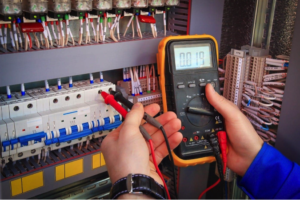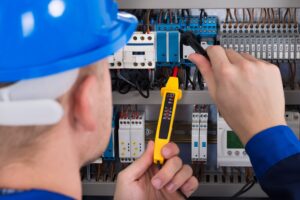In the modern workplace, you might have come across electrical appliance tagging – those little labels affixed to various devices and equipment. But have you ever wondered about the significance of these tags? At Test and Tag Sydney, we champion the cause of appliance tagging services in Australia. The reason is simple: without proper risk management procedures in place, the safety of individuals within your business could be compromised – a scenario no one wishes to encounter.
Every day, our skilled technicians encounter potentially hazardous appliances during their inspections. They often come across situations where equipment is being misused, damaged, or has gone without inspection for extended periods. These cases might involve commonly used items like microwaves or coffee machines, or even forgotten power boards lurking in the corners.
Understanding Electrical Appliance Tagging: So, what exactly is electrical appliance tagging? After equipment undergoes thorough inspection, it’s labeled with a tag signifying its safety for use on the specific testing date. These assessments are conducted in line with the current Australian standards. The tags play a crucial role for businesses, helping them keep track of testing requirements and fostering a culture of safety within their premises. Beyond identification, these tags furnish essential details such as model number, serial number, date of manufacture, and other pertinent information.
The Significance of Electrical Appliance Tagging: Why is this process of tagging so vital? In a nutshell, it’s about identifying and rectifying faulty items before they lead to electrical shocks or, worse yet, fires. The risks extend beyond mere shocks; overlooked electrical appliances can pose a fire hazard. According to recent data from the CFA in Geelong (Victoria), cooking and electrical fires rank among the leading causes of fires in the region.
Through our appliance testing and tagging services, we’ve managed to identify electrical faults before they escalate into fires. However, the impetus for action lies with businesses – awareness about the critical role of electrical appliance tagging empowers informed decisions that safeguard your enterprise.
Prioritizing Electrical Safety: The imperative of electrical safety cannot be overstated. A report from the Government of Western Australia reveals that there were 1,644 reported electric shocks in the state during 2015-16, excluding fatal incidents. This underscores the need for collective vigilance. As a business owner, you can contribute by investing in regular inspection services.
Navigating Regulatory Standards: Statutory testing standards, maintained by the Australian Government and Standards Australia, serve as the backbone of electrical safety regulations. These standards transcend checkbox formalities; they’re designed to effect real change and save lives. They’re consistently reviewed to align with the latest safety practices.
Non-compliance comes with consequences. Business owners failing to meet electrical safety requirements could face penalties. These penalties vary based on jurisdiction and the severity of the incident. For instance, in Queensland, individuals might be fined up to $50,000 for negligence related to health and safety duties or electrical safety obligations, while organizations could be fined up to $500,000.
Qualified Experts for Testing and Tagging: Electrical testing and tagging are paramount in workplaces to preempt potential hazards. The frequency of inspections hinges on factors such as equipment type and environment. While manufacturing or construction facilities demand frequent testing, residential settings might require less frequent checks
Test and Tag Sydney, Australia
So, what are you waiting for? Now that you know the importance of electrical appliance tagging, get in touch with us today. There’s no better way to prepare your workplace today. If you own or operate a business, you need to be vigilant – always. Call 0476 888 078 for instant quote
Did you find this article helpful? Make sure you share it around – we all have a duty to spread safety awareness.




